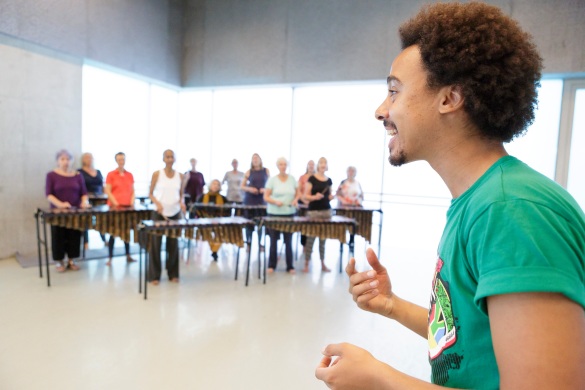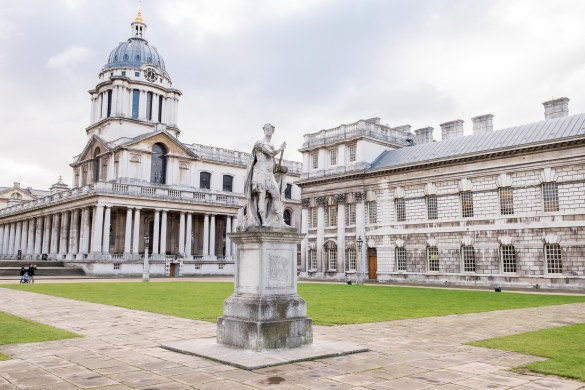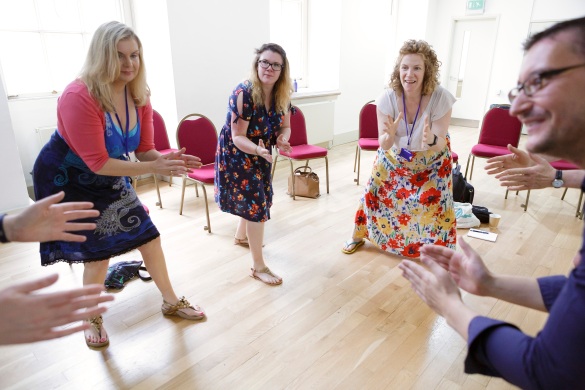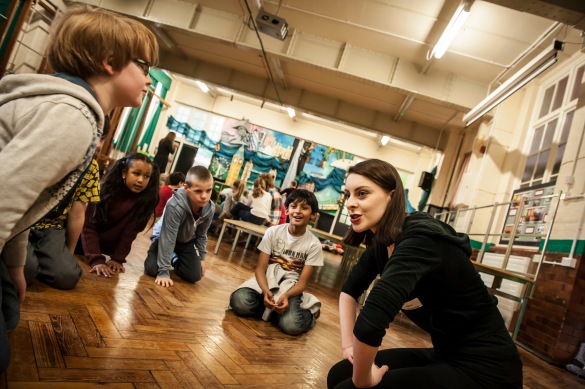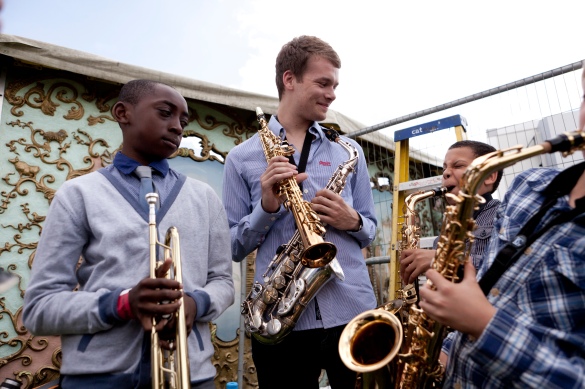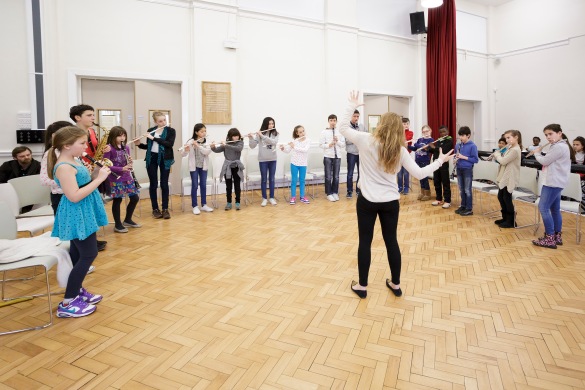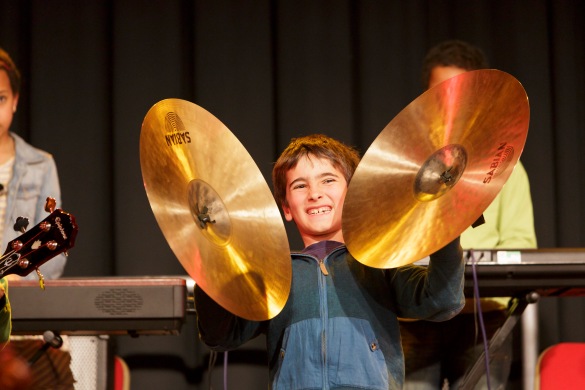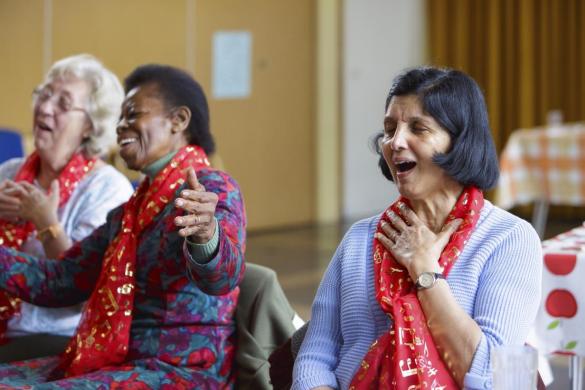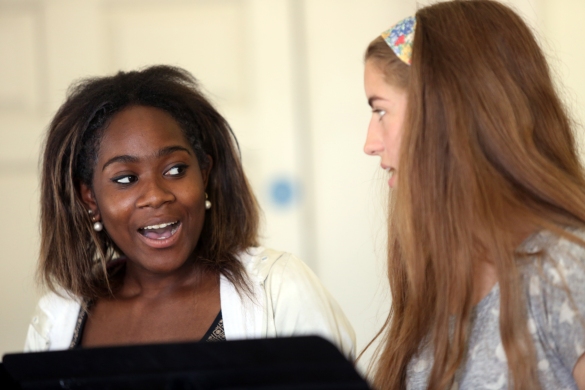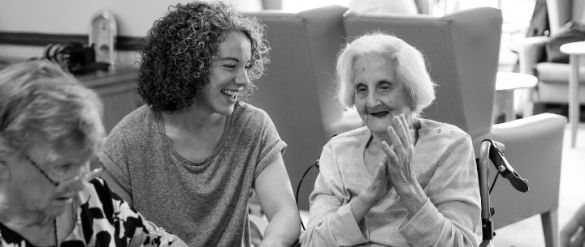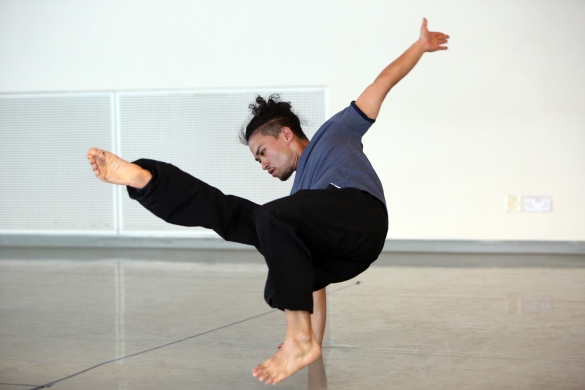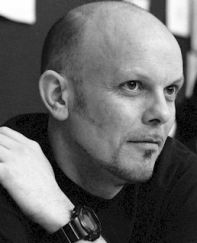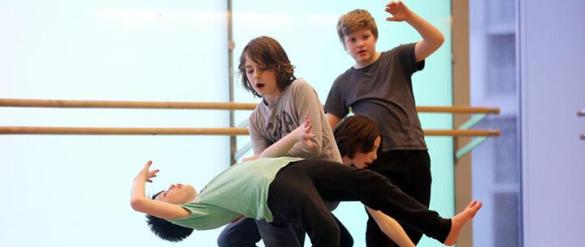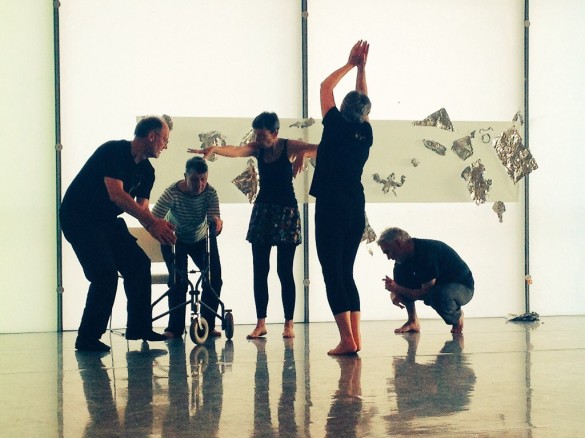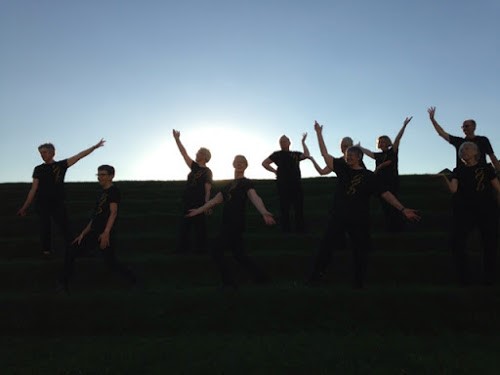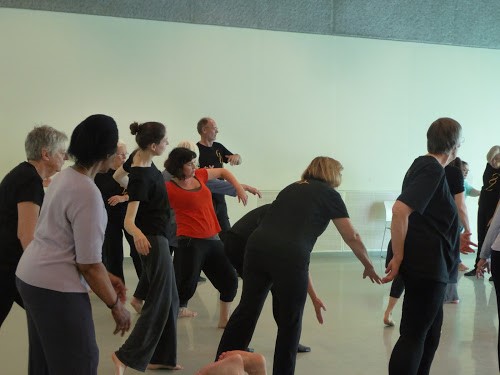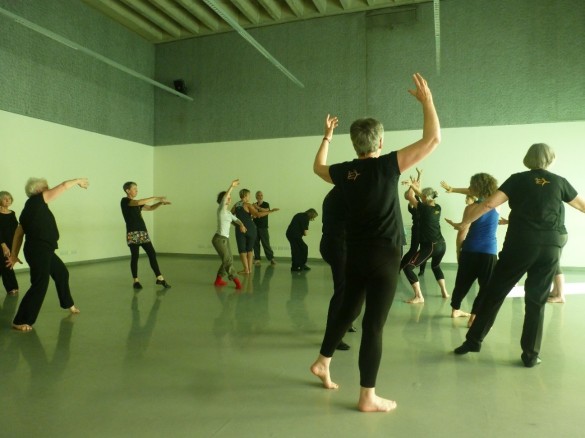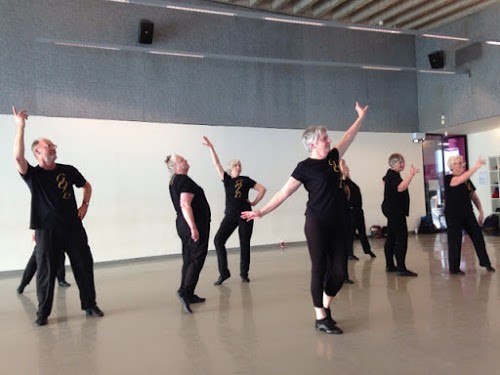It’s been a busy Spring term for Retired not Tired, Trinity Laban’s programme of music and dance activities for the over 60s. The Arts Befriending Group based in Sydenham and Young at Heart in Bellingham have been stretching their vocal chords in two intergenerational encounters. Young at Heart took part in a two way exchange of song and samba with year 11 pupils from Brent Knoll Special School in Lewisham, while the Arts Befriending Group sang side by side with some of our own Trinity Laban vocal students.
‘Spring Forth!’ – Lunchtime Concert, Tue 8 March
After a very successful initial visit in May 2015, The Arts Befriending Group returned to King Charles Court to spend the day singing and socialising with 10 Trinity Laban vocal students. The two groups, led by experienced singer, composer and Trinity Laban alumna Natasha Lohan were preparing to perform to an audience of staff, students and external partners in a lunchtime concert. The programme included a selection of 20th Century classics chosen by the Arts Befriending group- from Mary Poppins, to Hal David and Burt Bacharach’s hits, there was something to put a spring in everyone’s step!
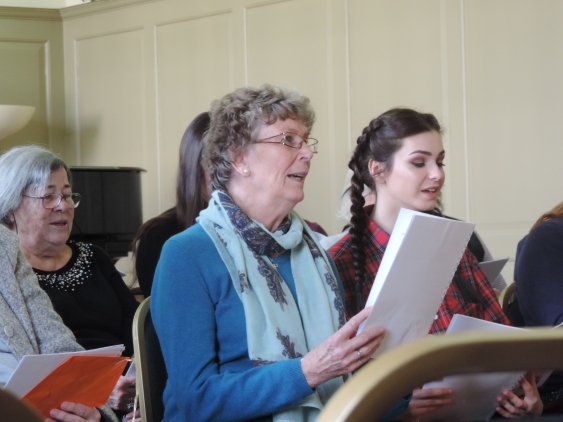
Photo: Tess Robinson
The Arts Befriending Group, one of the four music and dance groups that make up Trinity Laban’s Retired not Tired programme for the over 60s, is a weekly singing and social group run in partnership with Ageing Well Lewisham. Natasha meets with the group weekly to work with them on learning songs of their choice and creating their own new material.
This term, the group has also been joined by Matthew Crisp, a first year violinist who has been supporting Natasha in preparation for and during the performance. Matthew has been a welcome addition to the group, performing to them regularly and arranging parts for the final performance, and has benefited from the experience of getting out into the community to work alongside a professional music leader. Pianist Panaretos Kyriatzidis and myself on violin also joined the group on the day.
It was a tough ask to put together a performance with just an hour and a half’s rehearsal time but the newly formed super group stepped up to the challenge, creating a fantastic uplifting performance to celebrate the arrival of Spring. The group were keen to give the audience a flavour of what they get up to every Tuesday, so the concert began with a breathing and vocal warm up for everyone present involving a Tibetan bowl to create a drone.
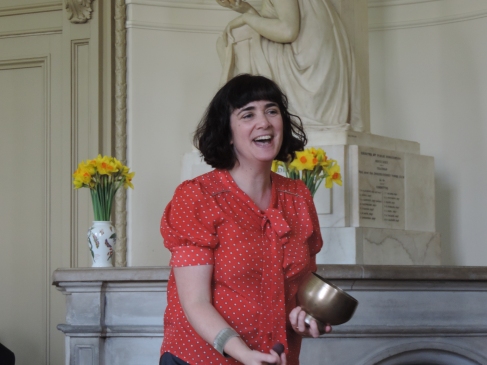
Photo: Tess Robinson
To open the performance, resident thespian Norman Flynn recited two verses from Shelley’s poem Cloud, accompanied beautifully by Matthew’s rendition of Ladies in Lavender on violin.
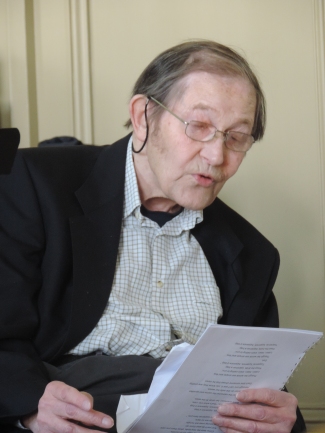
Photo: Tess Robinson
A highlight of the concert had to be a rendition of the Mary Poppins classic- Let’s go fly a kite, complete with handmade kites designed, made and waved by the group!
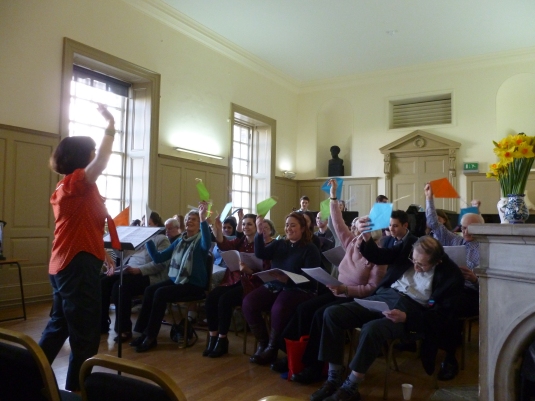
Photo: Matthew Crisp
The concert continued with a medley of 20th Century ditties and the audience were encouraged to join with the classic Raindrops keep fallin’ on my head. The concert ended with Burt Bacharach’s Close to You which had the whole room singing along. Being up on stage, it was amazing to see the joy that the performance and singing along brought to people’s faces. If you weren’t smiling at the beginning, you certainly were by the end!
The value of this side by side exchange was clear from feedback given by all those involved:
‘The pleasure, pride and joy that the members share in the group is so obvious every single week and that is a very special thing to witness.’– Matthew Crisp, student violinist
‘All the students were so welcoming and it was good being able to chat to some of them and hear their hopes for the future’ – Arts Befriending Participant
‘I felt very lucky to sing with them, it felt really special, especially as you could feel how much they loved singing the numbers!’ – Trinity Laban Vocal student
The Spring Forth legacy now lives on with one of the kite props now flying proudly on the Learning and Participation board in the King Charles Court admin offices!
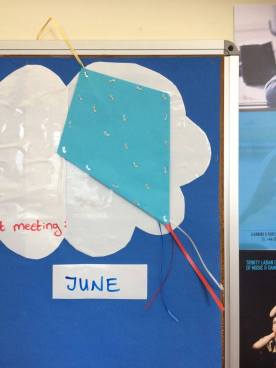
Young at Heart & Brent Knoll Special School- Exchange
In the early part of the Spring term 2016, our Young at Heart group led by Zoe Gilmour embarked on a new collaboration with year 11 pupils at Brent Knoll special school in Lewisham. The core aims of the project placed emphasis on challenging perceptions across generations and exploring artistic means of communication between two local community groups that may not otherwise have met. In sharing skills and interests and deciding collectively on music to share to the other group, a better understanding of each other’s circumstances, lives and histories was sought.
Young at Heart are a social group that meet weekly in Bellingham green, and are supported in music and craft activities by Zoe Gilmour. Second year trumpet player Sarah Owens has also played a vital role in supporting Zoe and the group with the exchange of material (check out Sarah’s blog HERE).
‘It’s incredibly rewarding to see the smiles on their faces when they hear and see a real instrument being played in front of them.’ – Sarah Owens
The group decided that they wanted to share one of their favourite music hall songs- My Old Man with the Brent Knoll students. Zoe created visual drawings of the lyrics to the song which were used as an effective form of communication between the group, as they wrote and drew thoughts and ideas throughout.
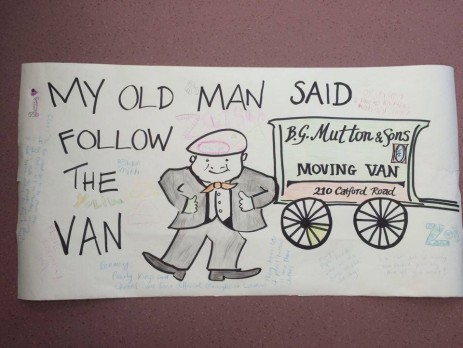
In the first session at Brent Knoll, after some active introductions so that everyone was well acquainted, the group listened to Young at Heart singing My Old Man. They picked up the lyrics and tune very quickly and were soon being recorded so that the results could be played back at Young at Heart. The children were keen to use their individual talents to put their own spin on the song- one young girl whistled parts of the tune while another student was keen to do a freestyle rap taking some of the lyrics as inspiration. Although initially very shy, he eventually plucked up the courage to record his rap after the session when everyone had left. When the recordings were shared with Young at Heart, the group were so impressed with the creative ideas that the children had come up with!
The focus in the music curriculum for the Spring term was samba, so the year 11s taught us a rhythm that they had been learning. This gave us the idea to send Trinity Laban’s samba kit to the next Young at Heart session so that they could have a go at learning the rhythm. As it happened, it was one of the ladies’ 90th birthday, and although hard of hearing she loved joining in on the bass drum!
The project culminated in a sharing session where 5 Young at Heart participants visited Brent Knoll to finally meet the children they had been communicating with face to face. The feedback from this session highlighted the importance of making links and encouraging understanding across generations:
‘I realise now after this that deep down we’re all the same.’ – Young at Heart participant
‘I learnt to get to know old people a bit better!’ – Brent Knoll year 11 student
‘The lad with the knitting was amazing!’ – Young at Heart participant
View the full range of material and resources that came out of the project HERE.
For more information on how to get involved in Trinity Laban’s over sixties activities click here, or email rnt@trinitylaban.ac.uk
By Lizzy Green- Retired not Tired Project Co-ordinator, Learning and Participation (Music)

